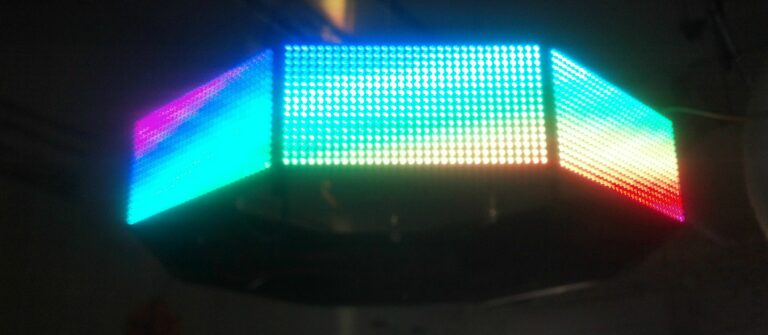By Tara Stratton
New York is one of the brightest places on Earth. Times Square is
definitely a large factor, but now a new BeagleBone Black-based
project, the Octoscroller, is adding to the glow.
The Octoscroller, which you may have seen at Maker Faire New York a
few weeks ago, is a project created by NYC Resistors Trammel Hudson
and Matt Mets. The Octoscroller is a classic message alert polygon
featuring eight 16×32 RGB LED matrix panels. It features LEDS at
eight to 16 levels of brightness for each color (producing
approximately 12-bit color). The userspace application renders
images into a shared memory frame buffer or can receive UDP packets
containing video images from the Disorient Pyramid
transmitter.

The BeagleBone Black open-source computer, based on TI’s Sitara
AM335x processor, is the brains behind the operation. The LEDscape
custom firmware runs on the AM335x processors programmable real-time
unit (PRU)two separate real-time microcontrollers built into the
die, with full access to the GPIO lines and cache-coherent access to
the main memory. The
LEDscape custom firmware allows the user
application render into a frame buffer, which is then driven to the
Octoscrollers panels by the PRU.
Trammel and Matt purchased the
16×32 RGB panels on the Octoscoller
from Adafruit Industries. The panels are very inexpensive since they
require continuous refresh by an external driver. With LEDscape,
BeagleBone Black can drive up to four chains of four panels, each at
0 percent CPU load. The panels are built as six parallel shift
registers, each with 32 bits and 12 16-channel constant current LED
drivers. The connectors have six data inputs and six control inputs
each: F1, G1, B1, R2, G2 and B2; and A, B, C, CLK, LTC and OE. The
three address select lines (A, B and C) select which two rows are
currently displayed. On each falling edge of the CLK line, a new bit
is shifted in on the six data inputs. On the falling edge of the LAT
line, the new data is latched and, when OE is held low, displayed.
To save on GPIO lines, the PRU shares the control lines between all
output chains and only needs the six additional data lines per
chain. If the HDMI hardware is disabled, four chains can be driven
by a single BeagleBone Black. The panels and BeagleBone Black are
powered by a
5V 10A DC supply.
If you missed Trammell and Matts Octoscroller at Maker Faire New
York, find out more about it from Trammells
recent blog post.


